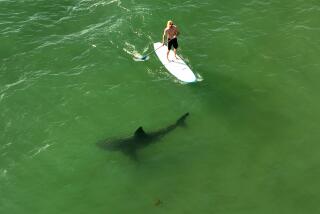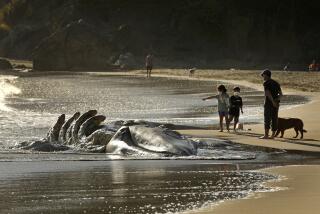Great white sharks show diversity in diet, study says
Great white sharks may munch on a wider array of sea creatures throughout their lives than previously thought, according to a new study published Friday in the journal PLoS ONE.
The great whites are well known to many as the stars of “Shark Week” and as one of the ocean’s most feared predators. Researchers have long believed that a shark’s diet evolves over its lifetime as it grows, moving from small prey like fish to larger animals like seals and, every once in a while, humans.
But in the new study, the researchers found that great whites show a remarkable diversity in their diets. Even sharks that live near each other ate differently throughout the course of their lifetimes, and some sharks never made the transition to large animals at all.
The researchers, from UC Santa Cruz, studied the vertebrae of 15 great whites that were caught off the West Coast of the U.S. between 1957 and 2000. When sharks eat, a record of their diet is stored in their vertebrae in the form of carbon and nitrogen. Over time, the elements amass as bands in their vertebrae, akin to a tree’s rings. Because animals lower on the food chain have different levels of carbon and nitrogen in their tissue than animals higher on the food chain, researchers can tell what the sharks ate over time by looking at bands from different periods in a shark’s life.
The researchers expected to find a gradual change in the levels of carbon and nitrogen over time, signifying increasing consumption of bigger animals as they got older. This would lead to a plateau in the elements’ levels once the transition to large animals was complete.
While they saw that pattern in some sharks, the diets varied a great deal between different sharks. Some sharks appeared to eat small animals, such as fish and squid, for their entire lives. Others seemed to get feisty while still young, eating bigger animals like seals virtually from the get-go.
The researchers also noticed another shift over time: In general, sharks have recently consumed more marine mammals than they used to, a change the researchers attribute to the Marine Mammal Protection Act, which passed in 1972.
You can read the full study here.
Return to the Science Now blog.






